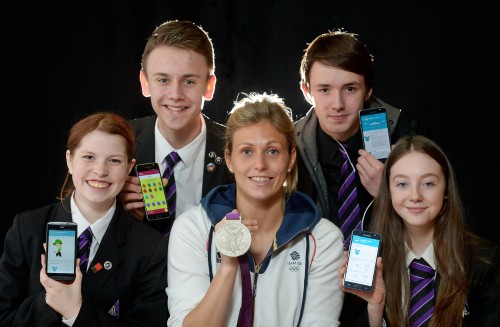Gemma, who won silver in judo at the 2012 London Games, met high school pupils who are trialling a personalised system designed to improve knowledge, promote healthy behaviour and help prevent obesity.
Gemma was at Armadale Academy in West Lothian to mark the mid-term of a six-month trial, which will see Edinburgh Napier researchers and colleagues from the University of Edinburgh and NHS Lothian analysing users’ data.

Fifty young people in Scotland, aged 13 to 16, have volunteered to test the PEGASO system - Personalised Guidance Services for Optimising Lifestyle. It includes six apps that enable users to monitor their diet, physical activity and sleep.
The system, which is also being tested in Italy, Spain and England, includes interactive games, guidance, and personalised feedback on health behaviour. A key element of the platform is its co-design, where software engineers used input from teenagers to develop PEGASO.
Once complete, pupils will feed back their experience of PEGASO, and log any changes in their health behaviour. Their results will be compared with those of another group of teens who have not used the system.
Gemma, who hopes to become a PE teacher, said: "I am really pleased to be able to support this exciting initiative, which is all about promoting health and fitness in a way that is easy to use and relevant."
The research team hopes to feed the results of this pilot project into a much larger study that will assess whether PEGASO can lead to better health outcomes for teenagers.
The Scottish arm of PEGASO is led by Telescot - a collaborative research programme between University of Edinburgh, Edinburgh Napier University and the NHS (www.telescot.org).

Dr Janet Hanley, reader in Edinburgh Napier’s School of Health & Social Care, said: "Young people are expert users of smartphone technology. Their input into the design and testing of these systems is vital.”